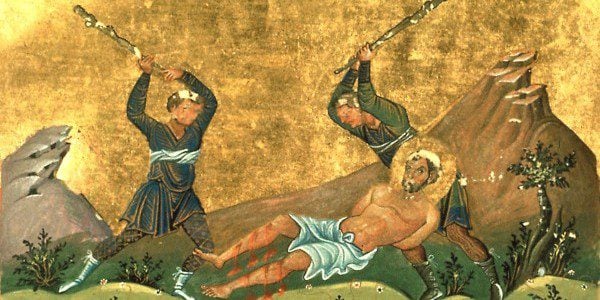In my Evangelicalism and Fundamentalism course today, we’ll be talking about the history of slavery and segregation in American Christianity.

It’s the ugly underbelly we can’t ignore, but so often would rather pass over quickly.
Many of (white) American Christianity’s great “heroes of the faith” defended slavery on “biblical” and theological grounds–as God’s punishment for sin or the outworking of a divinely ordained and divinely sanctioned hierarchy.
Some argued that slavery is necessary for a robust economy, which is necessary for the propagation of the “gospel”–but which “gospel” is that, again? A number of them owned slaves themselves (Jonathan Edwards, George Whitfield, for two prominent examples).
Even many years after the Emancipation Proclamation and in the decades following the Civil War, some theologians and denominational leaders vigorously defended white supremacy and segregation, and refused to grant equal rights to freed slaves and others, simply because of the color of their skin.
Jack Rogers, in Jesus, the Bible, and Homosexuality, details a disturbing and eye-opening description of the way that the Bible was used to defend slavery and to uphold white supremacy in the years preceding and even following the Civil War.
He writes about Robert Lewis Dabney, the “premier theologian of the southern Presbyterian Church from 1865 until 1892,” who included a one-hundred-page defense of slavery in his book, A Defense of Virginia, a book written as the war was unfolding (22).
After the defeat of South, he followed up with a second volume, in which,
…Dabney set forth a genetic argument for the inferiority of Africans, arguing that blacks and whites were different and unequal species. That implied for him that blacks were less capable than whites in most aspects of life: “But while we believe that ‘God made of one blood all nations of men to dwell under the whole heavens,’ we know that the African has become, according to a well-known law of natural history, by the manifold influences of the ages, a different, fixed species of the race, separated from the white man by traits, bodily, mental and moral almost as rigid and permanent as those of genus.” (22-23)
Dabney did as others had done, which was to interpret (inexplicably) the “curse of Ham” in Gen. 9, as an origin story for the “degeneracy” of Africans, and as designating slavery as God’s righteous punishment for their sin. It should go without saying that this interpretation is utterly lacking in exegetical merit, but nonetheless it was used as an Old Testament ground for their view of the inferiority of black people.
In a particularly ugly episode of Presbyterian history, a synod meeting in Virginia (in 1867) debated whether, now that they are freed from slavery, African Americans should be granted “full equality,” in the church, including the right to be ordained as ministers. While some ministers fought hard on the side of inclusion, Dabney’s white supremacist arguments won the day.
From Rogers’ book, which quotes Dabney’s impasioned speech (Dabney called the vote a “moment of life and death for the church”):
“Dabney appealed to the deep-seated fears of his white male audience: “He must be ‘innocent’ indeed, who does not see whither all this tends, as it is designed by our oppressors to terminate. It is (shall I pronounce the aborred word?) to amalgamation!” Dabney raised the specter that if African Americans were ordained, it might mean, “this Negro of yours, reviewing and censuring the records of white sessions, and sitting to judge appeals brought before you by white parties, possibly by white ladies!” He continued to press the possibility of a physical mixing of the races. “Do you tell me that after you have admitted this Negro thus to your debates, your votes, your pulpits, your sick and dying beds, your weddings and funerals, you will still exclude him from your parlours and tables?…I tell you, Sir, this doctrine, if it does not mean nothing, or if it does not mean Yankee hypocrisy, means ultimately almalgation” (23-24).
As Rogers points out, “Dabney’s speech made it clear that he was not simply reacting to the consequences of American slavery. Rather, he was proclaiming a doctrine of white supremacy” (24). “To Dabney, racial purity was the ultimate value, and racial segregation was essential to protect the purity of the white race” (25).
So just as century and a half ago, white supremacy, the assumed inferiority of other races, and a disgust of black flesh ran deep in the psychologies of white Christians–and it was explicit. Some of their “best” theologians devoted their time and energy to interpreting the Bible in defense of white supremacy, slavery, and segregation. They used that doctrine to tap into anxieties, fears, and prejudices in order to exclude, deny rights, enslave and abuse African Americans.
Granted not all did. There were white Christian defenders of racial equality and there were passionate abolitionists–and of course their number grew the years wore on. But ugly as it is, looking at this sordid part of the history of Christianity and of white American theology helps us to see why the psychology of white supremacy runs so tragically and sinfully deep–and can still be so difficult to extricate.
















